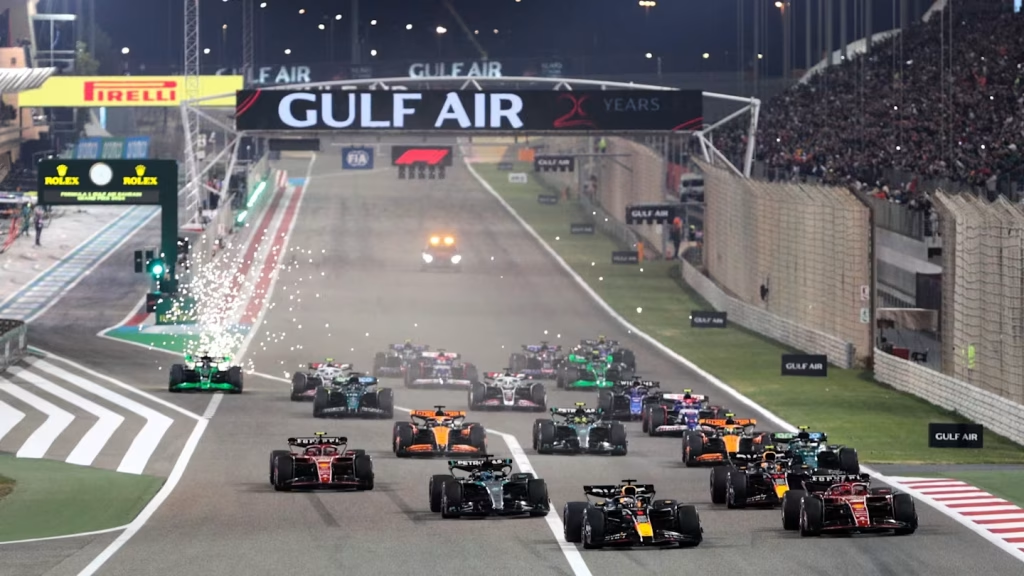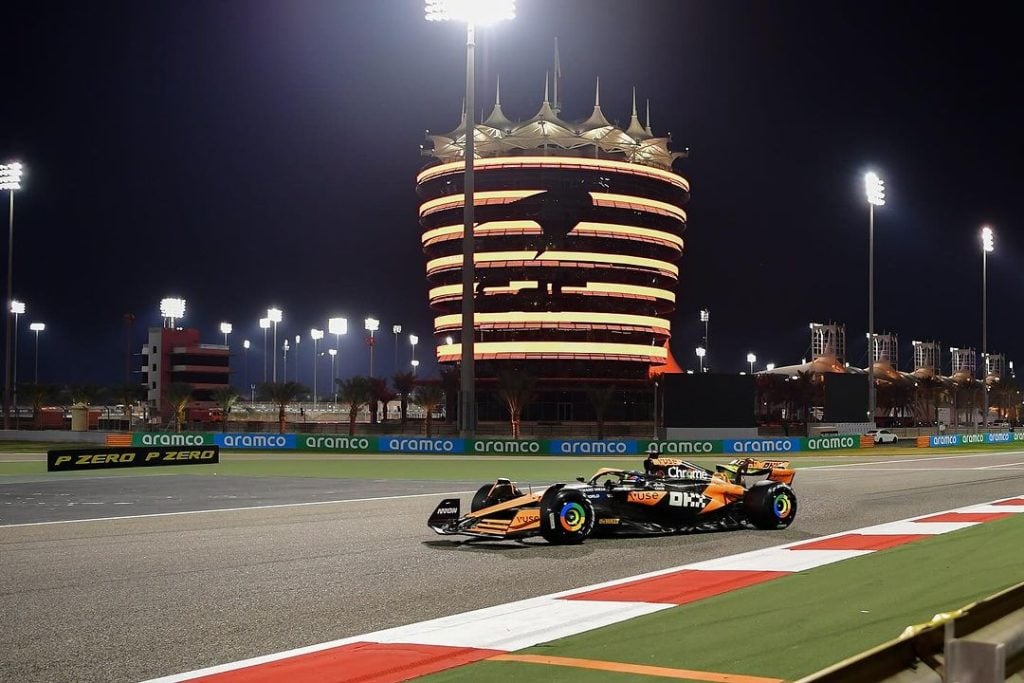The Middle East is experiencing a tourism surge powered by Formula 1. Grand Prix races in Bahrain, the UAE, Qatar, and Saudi Arabia are not just sporting events, they’re catalysts for international travel.
As the 2025 F1 calendar unfolds, data from other regions illustrates this global pull. Here’s how, as well as what, travel providers can do to leverage these trends, and what the Bahrain Grand Prix is doing to draw even more attention.

The draw of a Grand Prix weekend
Booking.com has released recent data that shows the travel intent surrounding Grand Prix events so far this year. Results for 2025 show:
- Australian GP (13-16 March): Attracts the most domestic interest with Australia ranking highest in search volume. Followed by the UK, New Zealand, and the US.
- Chinese GP (21-23 March): Attracts travellers from Japan, Thailand, and the Russian Federation as the top searchers.
- Japanese GP (4-6 April): Brings the Netherlands, Germany, Taiwan, the US, UK, and Australia together as a global event draw during this weekend.
The impact on the Middle East
The payoff for this is also evident in the inbound tourism numbers in the Middle Eastwith major Middle Eastern Grands Prix drawing tens of thousands of international visitors and spurring travel spikes. Abu Dhabi’s season-ending Grand Prix, for example, has solidified the city’s status as a global hub. The 2024 Abu Dhabi GP saw hotel rates skyrocket, up to 170% higher than the week prior, as global motorsport enthusiasts poured in.
Notably, European travellers led the charge: visitors from the UK, Italy, and Germany accounted for roughly 15% of total attendees. Industry data also showed flight bookings surging from key markets. During Abu Dhabi’s race week, arrivals from the UK jumped by 28%, with Italy entering the top rankings of source markets, reflecting strong demand from Europe.
Likewise, other Gulf races benefit from the Middle East’s geographic connectivity. The UAE and Qatar serve as airline hubs, making it easy for fans from Asia, Africa, and the Americas to fly in. It’s no surprise the Middle East is now one of the world’s fastest-growing sports tourism destinations, with events like F1 fuelling a significant portion of that growth.
What does this mean for travel providers?
Booking.com’s global insights back this up: motorsport fans are willing to travel long-haul for marquee races. Across different Grand Prix events, the United States, United Kingdom, Germany, and France consistently appear among the top source markets for searches and travel intent. In the Middle East context, this means a Grand Prix in Bahrain or Qatar can lure visitors from London to Los Angeles. Tourists see the race as a compelling reason to visit a new destination, and often extend their stay to experience the country. Sports becomes the hook, and the destination’s wider attractions close the deal.
Immersion and next level luxury
One reason Middle Eastern F1 races have such international appeal is their emphasis on next-level luxury and immersive experiences. Regional organisers and partners position each Grand Prix as a full luxury travel experience. Premium hospitality packages, from VIP paddock clubs to five-star hotel stays, are in high demand. In fact, top-tier hospitality for the 2025 Bahrain Grand Prix (like the exclusive Paddock Club lounges) sold out well in advance, reflecting the draw of upscale offerings.
Airlines are also capitalising on the F1 craze to enhance the travel experience. For instance, Qatar Airways (the official F1 airline partner) introduced Formula 1–themed onboard amenities for its Doha race, including limited-edition premium class loungewear and F1-inspired menus. This combination of luxury travel and sports is part of the appeal, flying to a Grand Prix becomes a glamorous journey in itself.
Experiential travel

Equally important is the event-based experiential travel that F1 enables. A Grand Prix weekend in the Middle East is more than the race, it’s a multi-day spectacle. Hosts organise concerts, festivals, and cultural showcases around the races. In Abu Dhabi’s Yas Marina or Bahrain’s Sakhir circuit, ticket holders enjoy world-class evening entertainment. Recent Bahrain GP events are expected to feature international DJs and Grammy-nominated artists performing post-race concerts, free for all attendees. At the circuits, fan zones come alive with roaming performers, carnival rides, and local food markets, turning the venue into a festival grounds.
Offering regional activities
Visitors can also indulge in authentic regional activities before and after race day. Think desert safaris and dune-bashing excursions in the Arabian sands, or exploring souks and modern attractions in host cities. The Middle East offers a distinctive setting for Formula 1 that enhances its tourist appeal.
Many F1 travellers come not just for the race, but to tick off bucket-list experiences. A day might start with breakfast at a luxe resort and end under the stars at a desert camp. During the Saudi Arabian Grand Prix in Jeddah or the Qatar Grand Prix in Lusail, visitors can venture out to ride camels on sand dunes or enjoy traditional falafel in a historic market, blending adventure with culture.
Also read: Middle East stopover programs: turn your next layover into a mini holiday
Attracting interest: Bahrain Grand Prix 2025

Middle Eastern stakeholders are proactively aligning their strategies to maximise this influx of travellers. Bahrain’s Gulf Air, the title sponsor of the Bahrain Grand Prix, for example, has teamed up on a special initiative to drive more interest in the event. It includes a charity auction of F1 memorabilia and premium experiences. Uniquely, Gulf Air expanded the auction’s offerings by adding Falcon Gold tickets for two (business class) on flights from Bahrain to global destinations like Singapore and Shanghai.
This move not only supports a good cause, it showcases how the airline is leveraging F1’s appeal to promote its top-tier product and routes. Essentially, the national carrier is using a Grand Prix to market luxury travel, demonstrating the relationship between aviation and event tourism.
At the same time, Bahrain’s tourism authorities curated travel packages to entice foreign F1 fans. In collaboration with Gulf Air Holidays, they have rolled out bundles that include return flights, hotel accommodations, race tickets, and ground transfers. By offering competitive rates for an all-in-one package, Bahrain has lowered the barrier for international visitors to choose the Grand Prix as a travel experience.
It’s an approach that has paid off: by early April, nearly all grandstand tickets have been sold out and international interest is high. The event’s slogan “The Desert Never Sleeps” also tapped into Bahrain’s unique selling point, a night race in the desert, appealing to fans seeking something different from the European circuits. The Bahrain case exemplifies how Middle Eastern destinations are orchestrating every element (flights, hotels, entertainment, CSR initiatives) around F1 to boost inbound tourism.
A collaborative effort will yield the best results
For the B2B travel industry, the success of F1 in driving inbound tourism is a valuable case study in cross-sector collaboration. Destinations, airlines, hotels, and event organisers are working in tandem to create integrated products. The result is longer stays and higher spend per visitor, as travellers drawn by F1 also book luxury suites, local tours, and additional nights. It’s an experiential travel ecosystem: the Grand Prix is the anchor, and the region’s hospitality and entertainment options complete the package.



